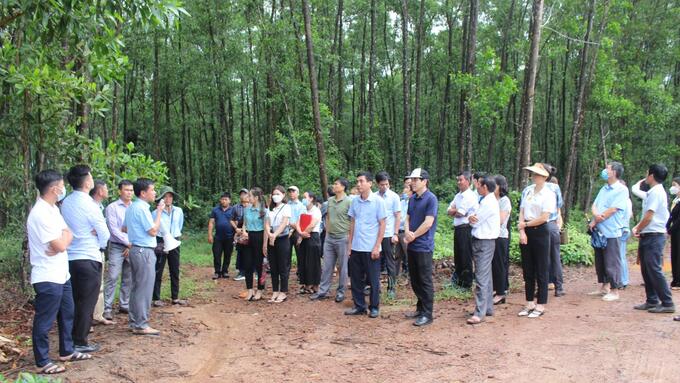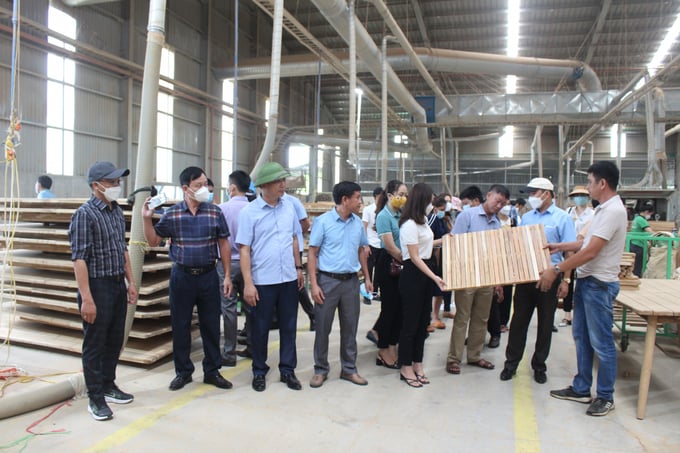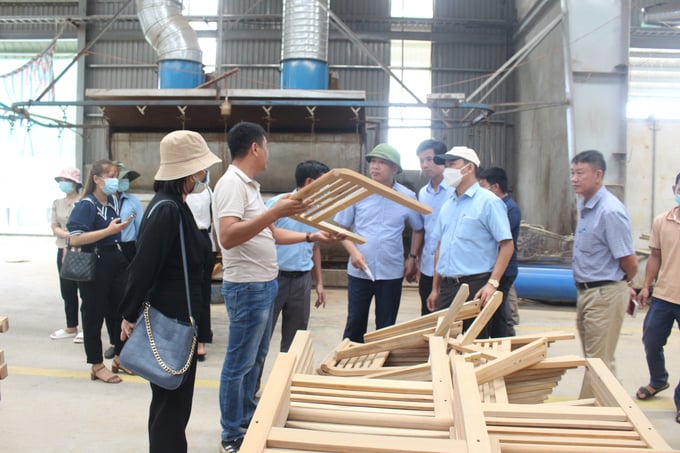May 30, 2025 | 16:55 GMT +7
May 30, 2025 | 16:55 GMT +7
Hotline: 0913.378.918
May 30, 2025 | 16:55 GMT +7
Hotline: 0913.378.918
Materials play a decisive role in the export growth of the wood processing industry thus the sector needs to ensure adequate raw material sources for its production and development.
In Quang Tri, the construction and development of standard timber material areas for processing and exports is considered the most perfect and sustainable solution.

Model of large timber plantation in Hai Lang district, Quang Tri Province. Photo: Viet Toan.
According to the Ministry of Agriculture and Rural Development Decision No. 1088/QD-BNN-KTHT dated March 25, 2022, approving a pilot project on building a standard agro-forestry material area for domestic consumption and export in the period 2022-2025, Quang Tri and Thua Thien-Hue are among five regions with raw material supply areas for agricultural and forestry production with a target for period 2022-2023 to reach 22,900ha of plantation timber area with sustainable certification (FSC, PEFC, VFCS...) in the central coast region.
Recently, the People's Committee of Quang Tri Province issued a document on the implementation of a pilot project to build areas of agricultural and forestry raw materials meeting standards for domestic consumption and export in the period 2022 - 2025. The province's Department of Agriculture and Rural Development (DARD) has developed a plan to implement this project.
Accordingly, Quang Tri will build FSC-certified plantation timber material areas in the 5 districts of Hai Lang, Trieu Phong, Cam Lo, Gio Linh, and Vinh Linh by 2025. The total area of the province's large wood material planting area is targeted to reach 13,000ha, of which 8,000ha are in Hai Lang, Cam Lo, and Trieu Phong and 8,000ha are in Gio Linh and Vinh Linh districts.
Quang Tri has 245,816ha of forest land, of which natural forests are 126,732ha while planted forests are 119,084ha. Since 2010, Quang Tri has issued many mechanisms and policies to promote the forest cover rate and carried out propaganda activities on converting the model of afforestation from woodchips to large timber plantations with sustainable certificates and support of international projects.
It has become the first province in Vietnam to be certified for sustainable forest management according to FSC standards for its household group model.
More than 10 years of implementing the FSC certified afforestation model have helped bring many positive values such as an increase in profit by at least VND5 million/ha/year, specifically contributing to the improving the ecosystem thanks to a comply with FSC's regulations on the environment. Especially, a linkage chain of FSC certified plantation timber consumption with business has been established attractin participations of many companies.
Over the years, Quang Tri Agricultural Extension Center (AEC) has always strived to accompany farmers in afforestation, large timber plantation, and transformation of forests from small timber to large timber to meet processing and export standards.

At a wood processing factory for export in Cam Lo district, Quang Tri province. Photo: Viet Toan.
Changing the perception of forest growers from small timber to large timber plantations is a long and persistent process. Over the years, Quang Tri AEC has focused on information and propaganda activities about the value and benefits of large timber growing.
Mr. Phan Ngoc Dong, Deputy Director of Quang Tri AEC, said that over the past time, the Center has deployed the new model of acacia hybrid afforestation using advanced techniques to improve wood quality on 25ha, implemented the model of acacia hybrid tissue culture following the large timber process on over 100ha, applied an acacia planting model similar to that of Australia on 40ha and undertaken another in forest transformation from small to large timber on 100ha...
The efficiency of planting large timber forests has been confirmed to be doubled over that of small timber afforestation with high resistance against natural disasters and an improved quality meeting demands of high standard timber for exports.
In the coming years, Quang Tri AEC will focus on developing new high-yielding acacia hybrids to meet the demands of supplying high-quality seeds for large timber plantations in raw material areas. This is a key project of the National Agricultural Extension approved for Quang Tri and Thua Thien - Hue to be implemented in 3 years from 2022 - 2024.

Quang Tri aims to become a "capital" of the wood industry in the central region. Photo: Viet Toan.
Although the sustainable forest management model brings obvious economic and environmental benefits, the percentage of forest areas with sustainable management certificates in the province is still very low, accounting for only 4.7% of the total area. This comes from many reasons including a lack of services to promote the business environment as well as the efficiency of certified large timber plantations; the participation of cooperatives and farmers in FSC is quite fragmented. In addition, the number of forestry service cooperatives to support households with planted forests is limited, accounting for only 5/32 cooperatives.
The construction and development of standard timber material plantation areas to serve the processing and export industries need to be well implemented.
Key goal of the central wood industry
Deputy Director of Quang Tri DARD, Mr. Nguyen Phu Quoc, said: "Implementing the Resolution of the 17th provincial Party Congress, term 2020-2025, special attention has been paid to afforestation and forestry development with the aims to improve productivity, quality and value of planted timber products, prioritize and strongly switch to large timber plantation according to FSC international standards, associate processing enterprises with raw material areas and boost production associated with the value chain.
With the annual afforestation and newly planted concentrated forests targeted to reach 6,500 - 7,000ha maintaining a stable forest cover of 50%, Quang Tri will become a center supplying wood raw materials plantation and processing in the Central region...
Currently, Quang Tri has a policy of 1-year support for cooperatives, individuals and households to plant large timber forests of up to 1,000ha with FSC certification."
Translated by Linh Nguyen

(VAN) Several scientists and farmers are experimenting with soil treatment in some key durian-growing regions such as Cai Lay (Tien Giang), Dak Song, Gia Nghia, and Dak R’lap (Dak Nong).
/2025/05/25/4127-3-073637_820.jpg)
(VAN) Thanks to the promotion from an FAO-implemented project, vegetable production in greenhouses in Moc Chau has seen strong development, from 1.5 hectares in 2021 to nearly 50 hectares in 2024.

(VAN) FAO has recently supported USD 140,000 to implement the project 'Risk mitigation human-animal interface risks through disease control initiatives in pig farming.'

(VAN) The People's Committee of Tra Vinh province has approved an adjustment to the investment policy for the Green Hydrogen Plant project, increasing its area to approximately 52.76 hectares.
![Reducing emissions from rice fields: [2] Farmers’ commitment to the soil](https://t.ex-cdn.com/nongnghiepmoitruong.vn/608w/files/news/2025/05/05/dsc08881jpg-nongnghiep-140632.jpg)
(VAN) Clean rice cultivation model in Thuong Tan commune, Bac Tan Uyen district, is assisting local residents in achieving sustainable agriculture by substantially reducing costs, increasing productivity, and protecting the environment.

(VAN) At the conference to disseminate Resolution No. 68, AgriS introduced its digital agricultural ecosystem and reaffirmed its commitment to accompanying the Government in promoting private sector development and sustainable agriculture.

(VAN) 'Blue Ocean - Blue Foods' initiative is designed to restore marine ecosystems and establish sustainable livelihoods for local communities by cultivating a minimum of 1,000 hectares of cottonii seaweed in the first three years.